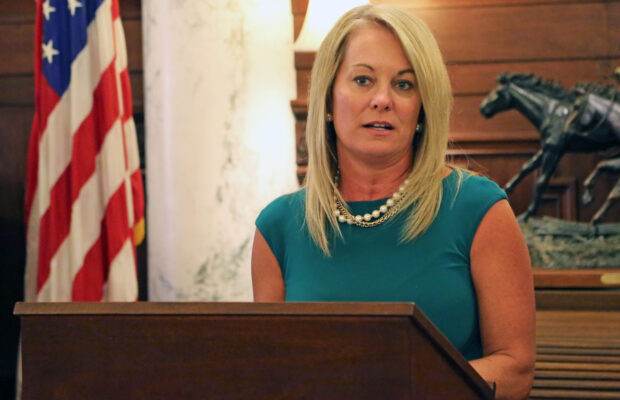Education leaders are worried about getting meals to students during school closures and ensuring that schools continue to receive normal state funding during the global novel coronavirus pandemic.

But some school leaders used Monday’s 80-minute webinar with Superintendent of Public Instruction Sherri Ybarra and other state officials to ask why all of Idaho schools weren’t closed in the first place.
Questions were asked anonymously, but several administrators cited President Trump’s new guidance to avoid gatherings of more than 10 people. So why are schools still in session, they wondered.
Answering a version of that question, Gov. Brad Little’s education adviser Greg Wilson repeated the governer’s guidance from Sunday’s conference call with school leaders.
“It’s important for districts and charters to make an informed, science-based decision in close consultation with their local health district based on the circumstances in their area,” Wilson said. “Local circumstances… and close consultation with local health districts should dictate the decision to close your school.”
The spread of the coronavirus has led to widespread disruptions across the globe, from the cancellation of professional and amateur sporting events, to statewide school closures in more than 20 states. Idaho’s first positive coronavirus case was confirmed Friday. As of 4:30 p.m. Monday, the state had confirmed five cases of coronavirus in Idaho after testing 270 people through a combination of the state and commercial labs.
Marilyn Whitney, the communications director for the State Department of Education, estimated the 55-60 percent of all Idaho K-12 students were impacted by school closures Monday. Whitney said her estimate did not include schools that remained open and experienced widespread absences Monday.
Idaho’s two largest school districts, West Ada and Boise, have closed amid concern over the spread of the coronavirus, as have other districts and charters. But some schools remained open.
Elke Shaw-Tulloch, administrator of the Division of Public Health at the Idaho Department of Health and Welfare, said guidelines and best practices are constantly evolving.
“You just witnessed right there how incredibly challenging this whole thing is,” she said, in response to a question about Trump’s new call to avoid gatherings larger than 10 people. “It’s rapidly changing.”
“We are finding that, sometimes, we are getting bits of conflicting guidance, sometimes there is not complete clarity between the CDC and what comes out of the White House, sometimes, to be perfectly honest,” Shaw-Tulloch continued.
When it comes to providing meals for students, schools have several options and Ybarra and her staff urged flexibility.
- Officials may use the school bus to deliver meals to students at home. They may contact the SDE’s child nutrition program to find out specifics.
- Schools that close may also use Summer Food Service Program or Seamless Summer Option to continue serving food at school, even after a school is closed and even though it is not yet summer.
- Students may also be able to pick up meals at school, although the parent would need to bring the student; parents would not be allowed to pick up meals on their own.
Ybarra announced several changes in response to concern over the coronavirus.
- Schools will continue to receive funding even if they close during the outbreak. Ybarra’s deputies said schools may apply for waivers to ensure their average daily attendance is not affected. But, deputies pointed out the bulk of funding, including funding for salaries, was set by formula based on attendance recorded through the first Friday in November.
- Ybarra and her deputies urged school leaders not to worry about making up days students will miss due to closure or absence. Because it is so late in the year, schools should apply for waivers from the minimum instructional hour requirements.
- The SDE is cancelling all trainings, conferences and events through May 1. That includes the traditional post-legislative tour and the suicide prevention conference.
- Idaho’s free SAT day is being moved back from April 14 to April 28.
- The state’s standardized testing window will remain open as planned but schools that are unable to meet standardized test participation requirements will be allowed to request individual waivers.
- Accountability and Assessment Director Karlyn Laraway said the SDE realizes schools have more pressing needs than completing teacher observations or student and staff accountability surveys. Laraway said the SDE will address accountability provisions in the future.
Ybarra pledged to continue hosting webinars with school leaders each Monday and Wednesday afternoon until further notice. She said she recognizes school leaders face enormous pressure, and she thanked them for their sacrifice and commitment.
“Go do great things for kids and stay safe,” Ybarra said in closing the webinar.
Idaho Health and Welfare officials offer the following advice designed to limit the spread of the virus:
- Wash your hands with soap regularly.
- Cover all coughs and sneezes.
- Stay home if you are sick or displaying symptoms.
- Avoid people who are sick or displaying symptoms.
Additional coronavirus resources:
- Idaho Education News is updating its map of school closures, as well as a list of schools remaining open.
- The state has published specific guidance for school officials online.
- The state is tracking the number of coronavirus cases and testing statistics in Idaho.
- The State Department of Education’s website also includes helpful links and contact information.
- Find all of our coverage here.
